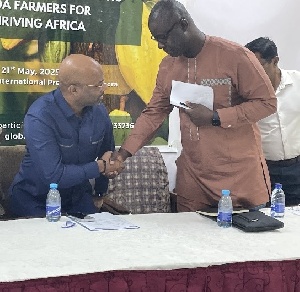Business News of Thursday, 29 May 2025
Source: www.ghanawebbers.com
Cocoa leaders call for stronger African alliance to influence global market
Launch of COFAAA by Dr. Godfred Seidu Jasaw and Alex Assanvo
Dr. Godfred Seidu Jasaw announced that Ghana owes international cocoa buyers 333,767 metric tonnes of cocoa beans. This debt must be settled in the upcoming cocoa seasons. The debt arises from declining production in recent years.
In the 2023/2024 season, Ghana’s cocoa production fell to 531,000 metric tonnes. This is the lowest level in over a decade. The country’s debt stands at US$2,600 per tonne, while the market price is around US$6,600 per tonne. This results in a potential loss of about US$4,000 per tonne when repaying the debt.
Rising domestic demand adds to these challenges. Current demand exceeds 400,000 metric tonnes, straining supply further.
To tackle these issues, Dr. Jasaw urged Ghana and Côte d’Ivoire to create a unified strategy. He suggested consolidating outputs from smaller African producers to enhance bargaining power globally.
“This approach will shift the power balance,” he stated. It aims to end conditions imposed by buyers that undermine producers.
Alex Assanvo, Executive Secretary of CIGCI, echoed Dr. Jasaw's views on strategic alliances among cocoa-producing nations. He noted that Ghana and Côte d’Ivoire have long competed against each other in the market.
“The more fragmented we are, the more leverage buyers gain,” Mr. Assanvo said. He emphasized that forming alliances can help share experiences and develop effective strategies for mutual benefit.
He also mentioned that CIGCI is working to include other key producers like Cameroon and Nigeria. “African countries produce nearly 80% of global cocoa but only capture 2% of the chocolate industry,” he added.
Nana Yaw Reuben Junior highlighted COFAAA's role in promoting sustainable practices alongside economic growth. He stated that COFAAA will empower farmers with climate-smart training and tools.
“Through capacity building and advanced traceability systems, we aim to equip farmers with skills for sustainability,” he said. This initiative seeks to boost crop quality and secure better market returns for farmers.











